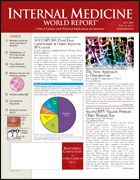ALLHAT Findings Hold Up Well 5 Years Later
Type of BP Drug Not Key Determinant of HF Results
By Wayne Kuznar
CHICAGO—Five years after the findings from the Antihypertensive and Lipid-Lowering Treatment to Prevent Heart Attack Trial (ALLHAT) were published, ALLHAT investigators are still supporting its conclusions in the face of continued criticism.
A special symposium at the American Society of Hypertension annual meeting was devoted to ALLHAT and its publications over the past 5 years.
In particular, the heart failure (HF) findings have been criticized on several accounts. ALLHAT found that the antihypertensive chlorthalidone (Thalitone, Hygroton) was superior to amlodipine (Norvasc) in preventing the development of HF and hospitalization for HF at 1 year, and it remained superior throughout the duration of the trial. Chlorthalidone was also superior to lisinopril (Prinivil, Zestril) on these end points, but only during the first year, after which the 2 drugs were found equally effective.
Stanley Franklin, MD, addressed some of the criticisms of the HF findings. One is that the discontinuation of diuretics upon entry into ALLHAT may have confounded the HF findings. Because ALLHAT participants were high-risk patients, some may have had asymptomatic left ventricular (LV) dysfunction that was unmasked by withdrawing diuretics at the start of the study, the critics contend.
Data on antecedent drug therapy were available for two thirds of the ALLHAT study population, and no significant differences existed between this group and the remaining one third in their history of coronary heart disease and revascularization surgeries, or their degree of LV hypertrophy on electrocardiography.
Using a technique called case-only analysis, "There was no evidence of a statistically significant interaction between prior drug type, especially diuretics, and the treatment effect for heart failure overall and during the first year," said Dr Franklin, clinical professor and associate medical director, Heart Disease Prevention Program at the University of California, Irvine.
"These findings strongly suggest that the type of blood pressure drug at entry is not a major determinant of the heart failure results," Dr Franklin said.
Because the accuracy of the HF diagnoses had also been called into question, Dr Franklin reviewed the validation process used in ALLHAT. Cardiology fellows who were blinded to the treatment arms extracted data from the hospital charts, which were reviewed by 2 independent reviewers who were also blinded to the treatment. The HF diagnoses were consistent across 3 separate sets of validation criteria: those used by the ALLHAT definition, as defined by the Framingham Heart Study, and the clinical judgment of the reviewers. Most important, the high mortality rate of 55% at 5 years in the patients diagnosed with HF "showed that the heart failure diagnoses were real," said Dr Franklin.
Whether or not the blood pressure (BP) differences between the 3 treatment arms influenced the HF findings has also been debated. Overall, systolic BP was 2 mm Hg higher in the lisinopril group than in the diuretic group, but in African Americans it was 4 mm Hg higher. Systolic BP was also slightly higher in the amlodipine group compared with the diuretic group.
Adjustments were made for BP when computing the results, but adjusting for BP differences is not an exact science, said Dr Franklin. The Framingham Heart Study demonstrated that HF risk depends not only on BP but on other risk factors that determine absolute global risk.
One downside to ALLHAT was an absence of data on 24-hour BP and nighttime BP measurements, which correlate better with ultimate risk than clinic BP measurements, he conceded.
The fourth major criticism is that the development of HF was a secondary end point, and that no significant differences were found between the 3 treatment arms for the primary end point.
JAMA
Looking to external data provides some validation for the HF findings in ALLHAT, said Dr Franklin. The best evidence comes from a network metaanalysis (. 2003;289:2534-2544) that showed a 12% relative risk reduction in the prevention of HF in favor of diuretics compared with angiotensin-converting-enzyme inhibitors. Admittedly, Dr Franklin said, a number of studies have not shown a significant difference between these classes of drugs on incident HF, but most of these combined a beta-blocker with a diuretic, which could have confounded the results.
